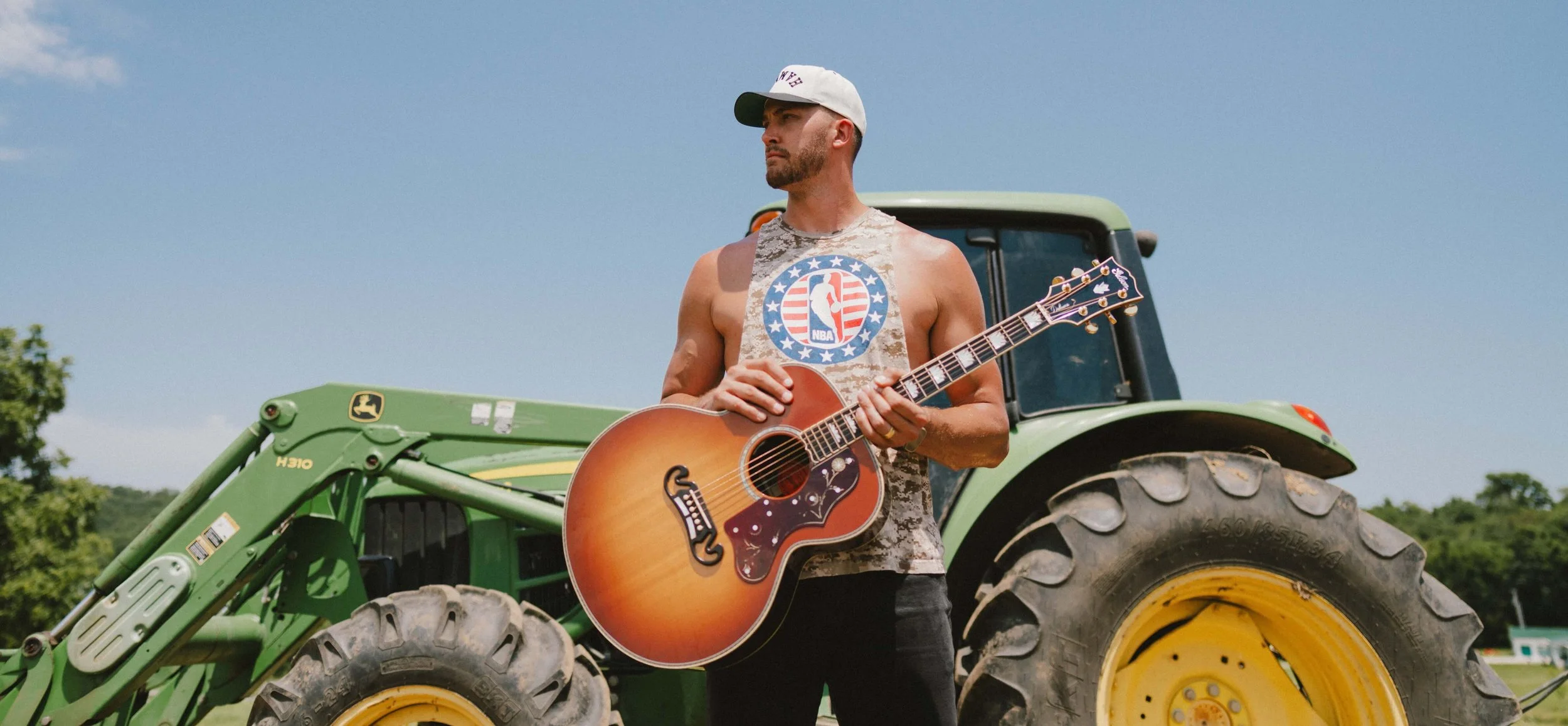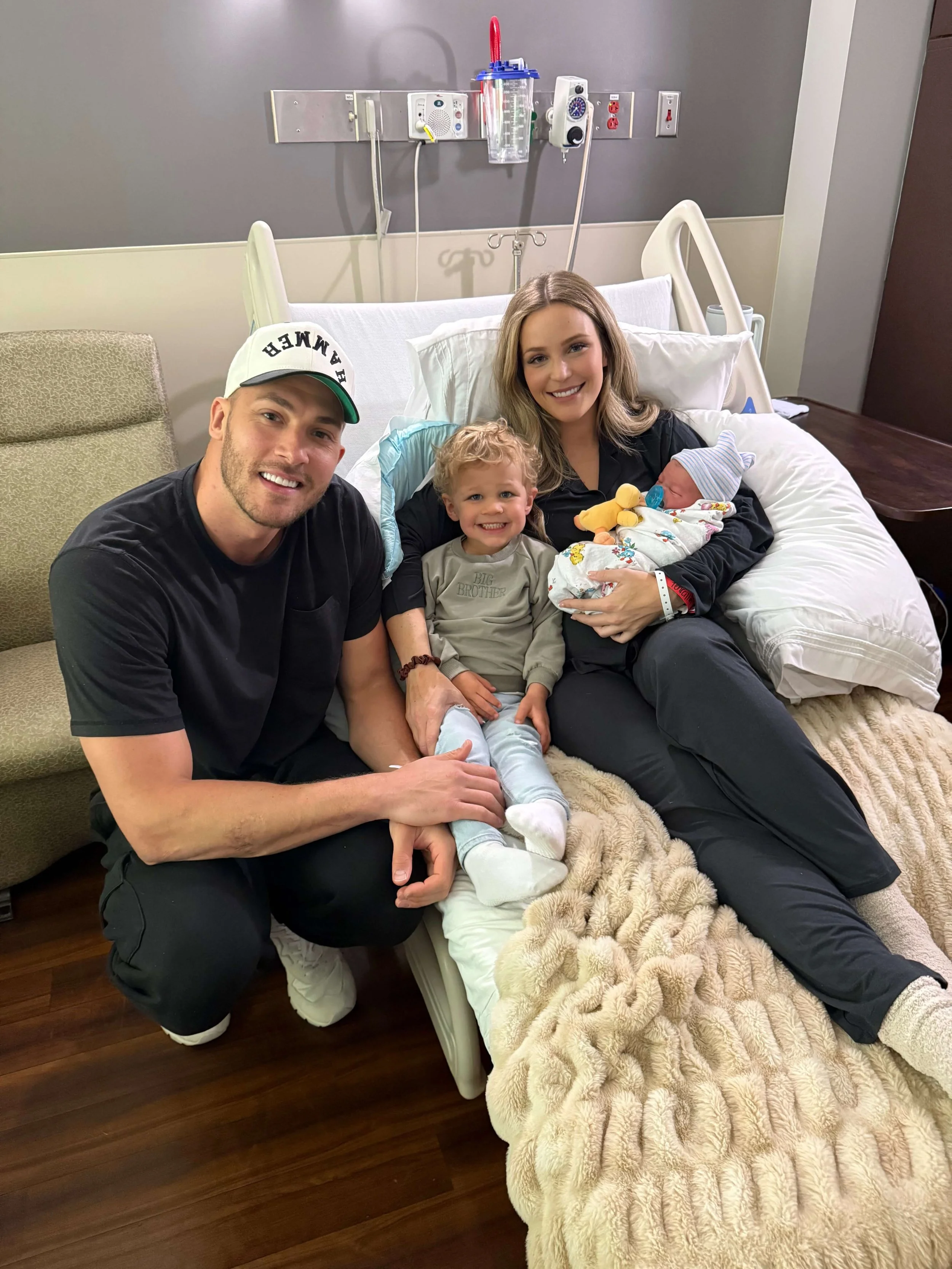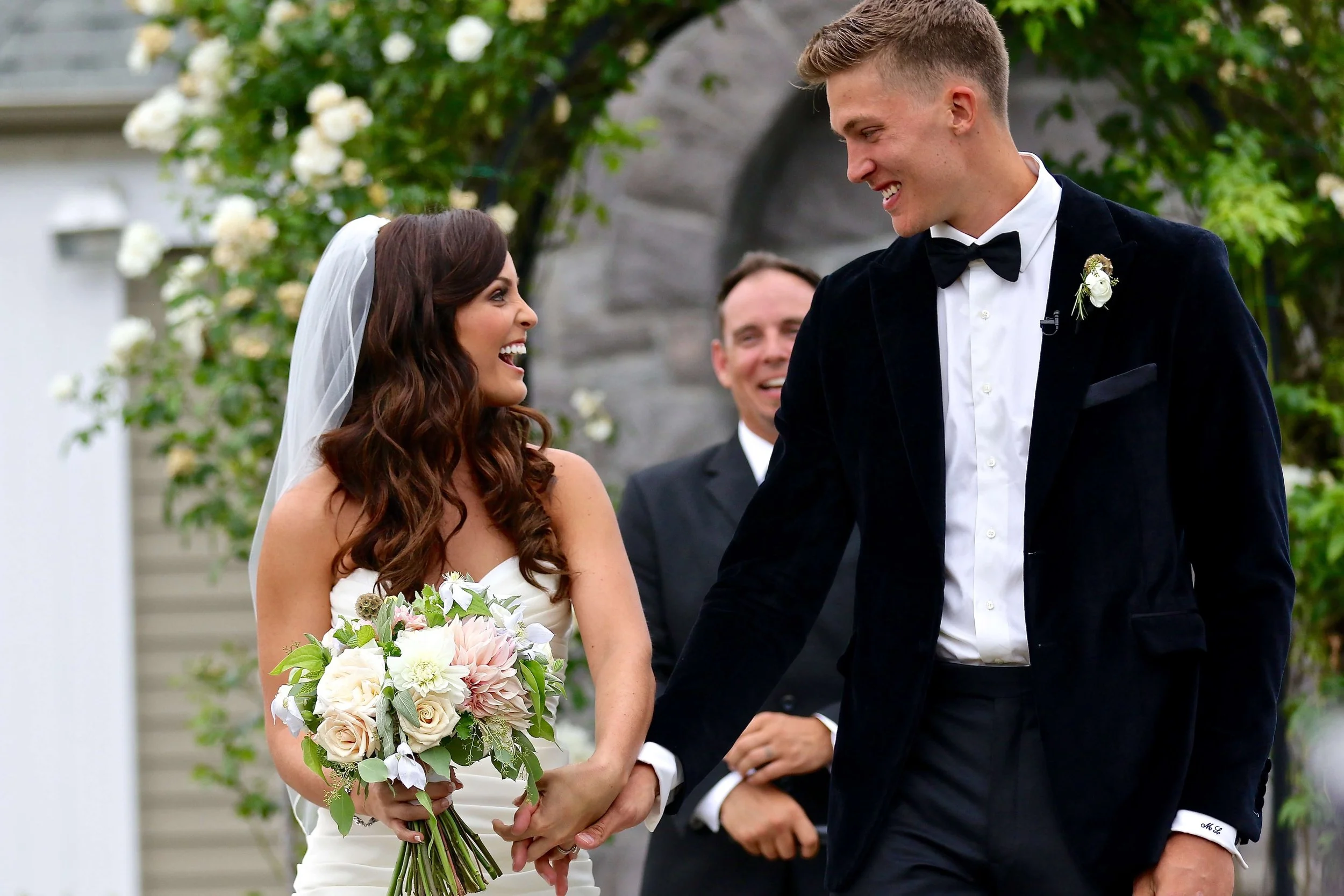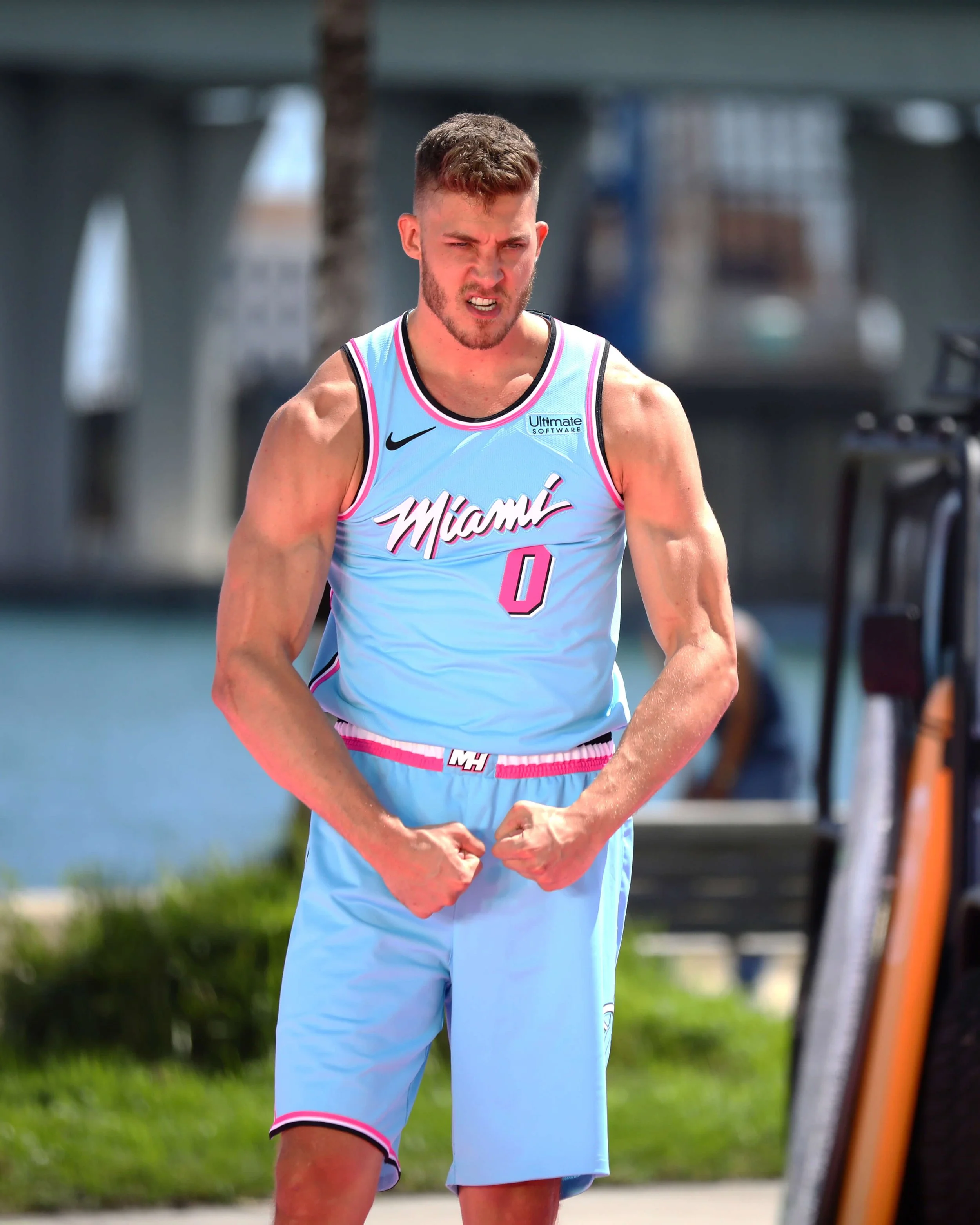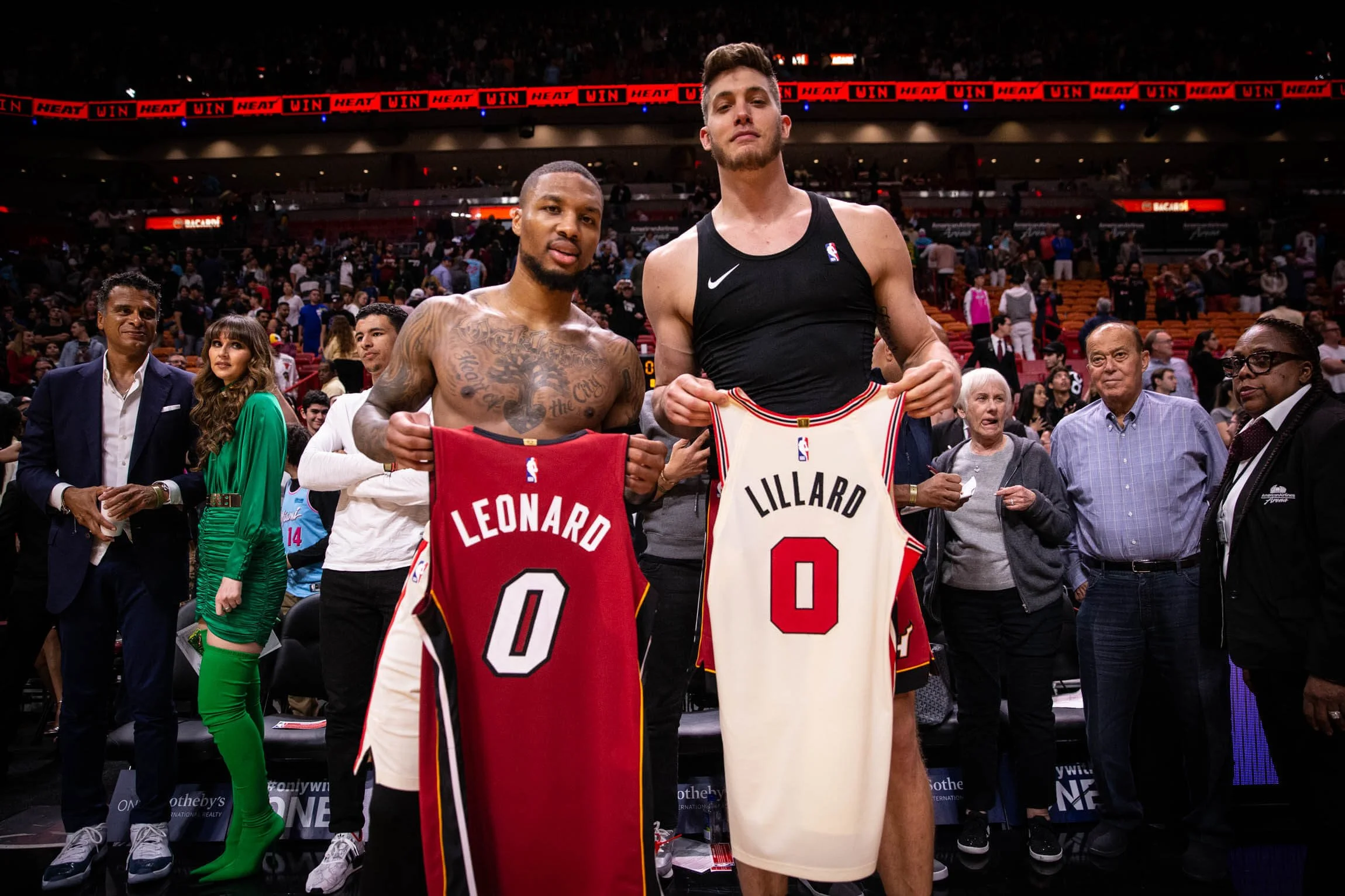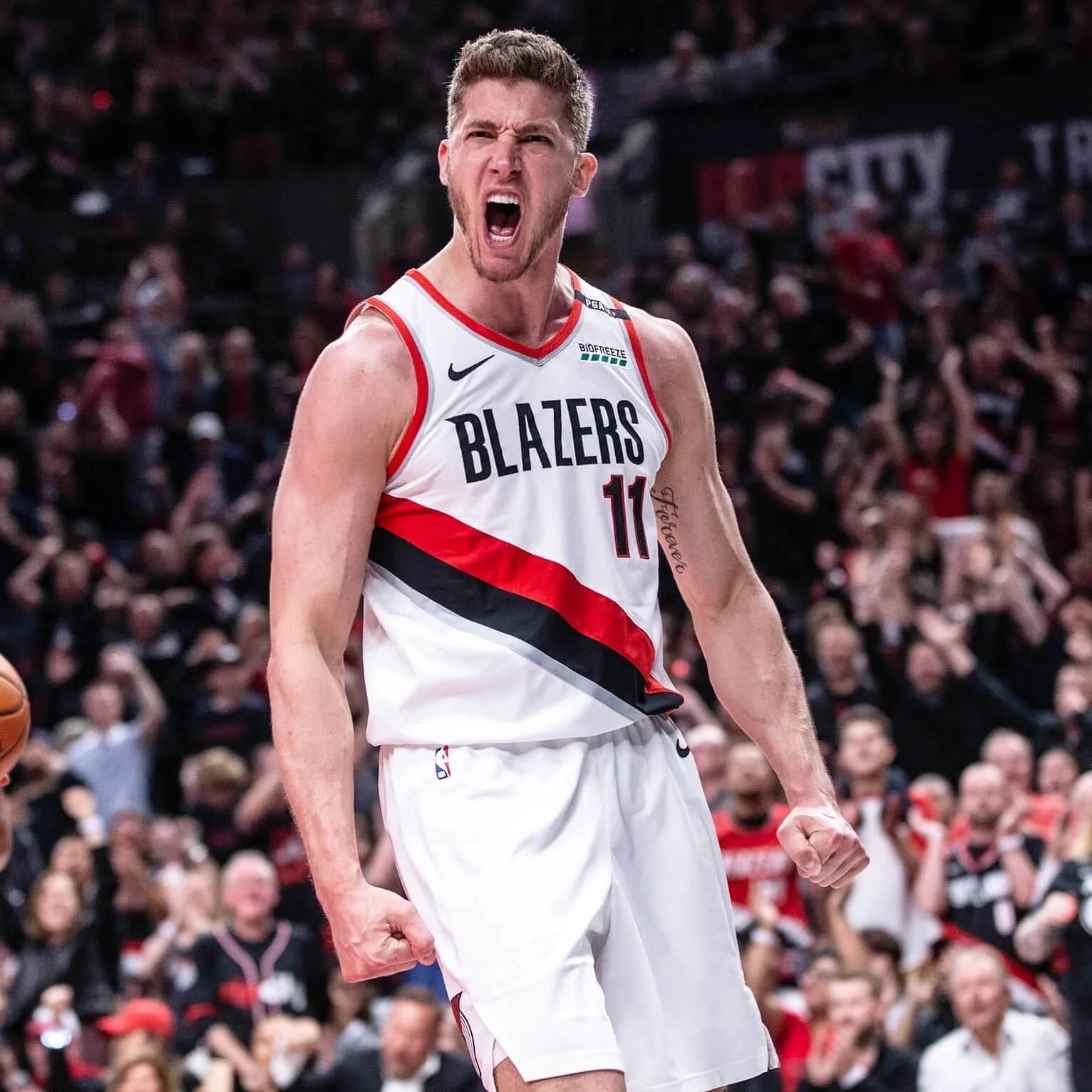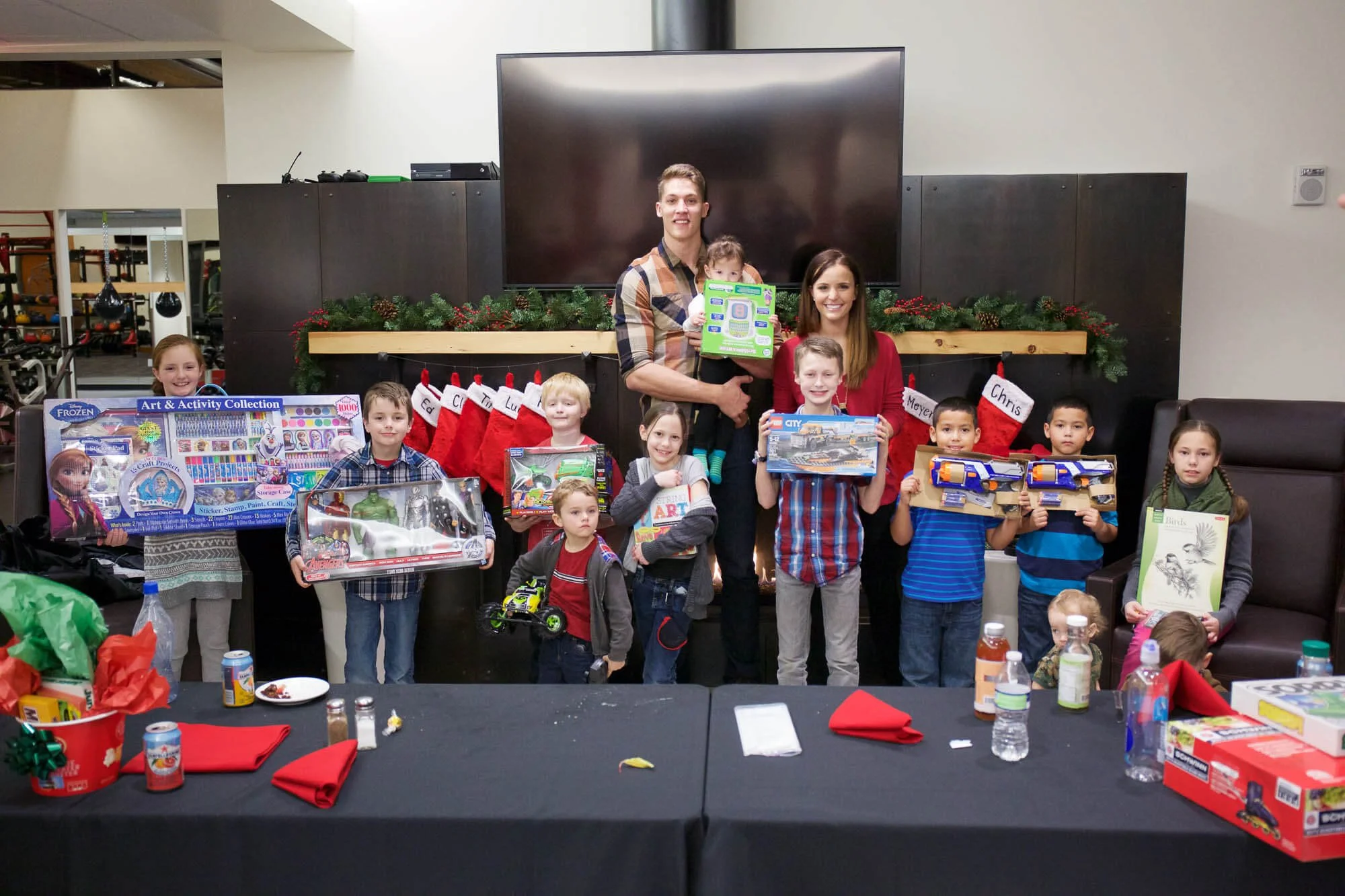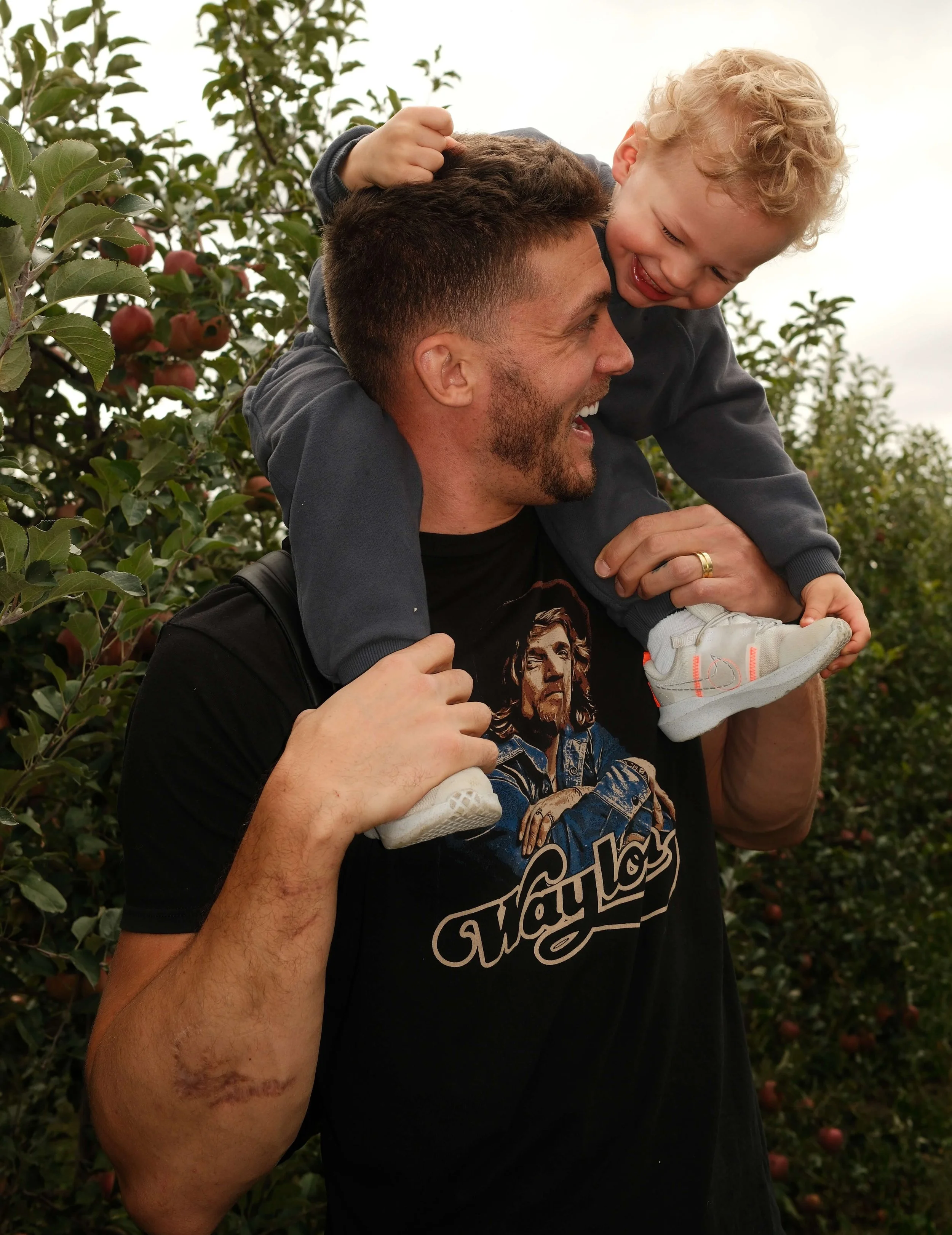After making amends, Meyers Leonard is living out his own country song
With his NBA career over, former Trail Blazer Meyers Leonard has turned to country music to light his fire (courtesy Meyers Leonard)
Updated 7/18/2025 2:37 PM
You heard the voice, but maybe you didn’t recognize it.
You saw the video, and the man strumming the guitar and singing, and then you knew.
Meyers Leonard has a new passion.
Two, really. Fatherhood has pulled him in like nothing before in his 33 years on the planet. On May 2, Meyers’ wife Elle had their second son, Jackson. First-born Liam just turned three. And now, creating music has grabbed Leonard’s attention and given him something new with which to strive for perfection.
Meyers and Elle with son Liam and baby boy Jackson (courtesy Meyers Leonard)
“I am so grateful for this phase of my life,” says the former Trail Blazer, now retired from the NBA and living in Nashville. “I have never been happier.”
Meyers and Elle will celebrate their 10th anniversary on Aug. 2.
“Our wedding was at Oregon Golf Club,” Meyers says via phone from his home. “Everything is going by in the blink of an eye. I am a father of two boys. I am so lucky to have Elle as my life partner. She is fantastic. She is a great mother. It is the most beautiful thing I have ever seen from her.
Meyers and Elle — who were married at Oregon Golf Club — will celebrate their 10th anniversary on Aug. 2 (courtesy Meyers Leonard)
“She can be independent but also very loving. And she is very smart, very driven. She put her whole life on hold for me (during his NBA career). I will forever be grateful for that.”
Leonard is having a blast singing, playing the guitar and writing music that he is releasing through YouTube and social media platforms. He is getting better, and he would like to get really good at his new hobby.
“I am super competitive,” he says. “There is that side of me — going after my dreams. But it doesn’t even compare, if I am being totally honest. Being a father is the best thing I have done in my life. It is not even remotely close.”
Baby Jackson “is quite large,” his father says with a laugh. He was 20 inches long and nine pounds one ounce at birth.
“Two-plus months, he now weighs 17 pounds,” Meyers says. “He is eating well, sleeping well.”
Through her pregnancy, Elle continued to be an influencer on her vlog (video blog) via TikTok and Instagram. She regularly updates her 40,000 subscribers on her experiences with such subjects as prenatal depression and anemia, and keeps them apprised of how Jackson and her mother are coming along.
“She is tiptoeing back into telling her story,” Meyers says. “I am super proud of her for that. When she speaks to the camera, she is so genuine with it, and that is why she has built such a big following.”
Do the Leonards want to have more children?
“I mentioned the possibility to a couple of family friends, and Elle was like, ‘Hold on. We are only two months into this,’ ” Meyers says, laughing again. “We have always said that eventually, three sounds like a good number. I think it would be cool for her to have a daughter, and I would love to have a daughter, too. But if she said, ‘I am happy with two,’ I would be fine with that.”
► ◄
Leonard helped the Miami Heat to the NBA Finals in 2021 (courtesy Meyers Leonard)
Leonard went pretty much dark after the much-publicized incident that forever changed his life in 2021. When on the injured list with the Miami Heat, Meyers used an anti-Semitic slur while playing a Twitch video game livestream session that earned him a $50,000 fine by the NBA, a suspension by the Heat and scorn from all angles.
For two years, Leonard was out of the NBA, living at their off-season home in Los Angeles. He resurfaced to play 11 games with the Milwaukee Bucks in 2023, his final NBA action, then disappeared from the public eye for most of the time since then. Except for his country music posts, that is.
In recent months, Leonard has made an appearance on a “Like a Farmer” blog and did a short interview with the Daily Illini at halftime of an Illinois basketball game. This, however, is the first major interview he has done with a news source since the “incident.” We had been communicating about it for several months. Meyers initially wanted to wait until officially announcing his retirement from the NBA with his first song on March 2. Then came baby No. 2, which pushed us back a couple of months.
The Leonards were raised in Illinois 200 miles apart — Meyers in small-town Robinson, Elle in Peoria. They moved from L.A. to Nashville in 2023 after composing a list of pros and cons for cities in which they considered to settle.
“We loved it in Portland, but it is really far away and hard for family to get there,” Leonard says. “We enjoyed Miami — the sunshine helps — and that was a possibility. At some point, we will end up splitting time between here and Florida.
“Nashville is only a four-hour drive to my hometown and a short flight to Elle’s. People here are nice for the most part. Schools and sports are great. It has a slow enough pace of life, but there is also access to everything you need. It checked more boxes than anywhere else.”
While rehabbing his ankle after the incident, Leonard and a friend had a conversation that got him to thinking.
Friend: “Dude, why don’t you play guitar? You like music. You are good at talking on the mic. Maybe one day you will write music.”
Meyers: “In my head, I was thinking, ‘No way in h-e-double hockey sticks would I ever write a song.’ ”
Soon, though, he began to play the guitar.
“I wasn’t necessarily a huge country music fan,” Leonard says. “My mom didn’t play country music. But I was always intrigued by it, and Elle got me hooked on it. As I have grown older, the lyrics and songwriting pull me in. It takes me back to the simple way of life I knew in Robinson. It really speaks to me.
“It was just passing the time at first. I could barely strum a guitar and play chords. But I was like, ‘This is kind of fun. I can throw in a Spotify and strum along and play with the song when I am with my friends.’ ”
Elle encouraged him to take it seriously.
“You are a born entertainer,” she told him. “Being 7 feet tall helped, but the reason you played in the NBA was you worked very hard, which you will do (with your music). You love being the life of the party. The fact is, you can play the guitar a little bit now.”
So Meyers got more serious, but thought, “No way in hell am I ever going to be able to sing and play guitar.”
After awhile, “I crossed that hurdle,” he says. But it was all a brand new pastime.
“I had never sung before,” he says. “No chorus in school. No vocal lessons, though I have since taken some in Nashville, and I have taken some guitar lessons. Now, I can sit down and write songs.”
Once the Leonards moved to Nashville, Meyers met a couple of songwriters, Steve Thomas and Caleb Mills, who have since become close pals. To date, the trio has written 27 songs together. The first one made available on all streaming platforms was “Good in Goodbye,” written about Leonard’s basketball career and leaving it for a family-focused life.
“There is good in goodbye,” he says in the song. “It’s been a hell of a ride,” is the final line. Meyers writes on X that every goodbye in his life — leaving Robinson, leaving Champaign after his sophomore year at Illinois, leaving single life for marriage — “has led to something good.” So far, the song has had more than 2 million views on Tiktok.
Since then, Leonard has dropped a song about once a month. The third single was “Paint the Room,” a love letter to Elle, surprising her with the gender of their second child. (They had a letter in a sealed envelope that said it was a boy, which sat unopened on their kitchen counter for six weeks. He got her permission to open it.)
“I want people to like what I do, and of course I want a zillion streams on my songs,” Leonard says. You can find Leonard’s songs on Spotify. “But I promised myself that, while I will write some songs that are just fun, I want to write songs that matter to me or to my family and friends. If just Elle and my immediate family and friends enjoy ‘Paint the Room,’ that is good enough for me.
“I am not very good with melody, but I can explain how I am feeling. I can give real-life examples, and they help me turn it into music. Getting my thoughts and feelings and emotions out through music feels nice.”
One of Meyers’ songs is titled “Beer in Heaven.” It is about his father, James Leonard, who died at age 46 in a freak bicycle accident. Meyers was six years old; brother Bailey was eight. The song is scheduled for release on Sept. 11, James’ birthday.
“I have thought about how cool it would be if one day I could get to talk to him,” Meyers says. “In the song, I sing that maybe one day we can talk about what he saw in me and all the life experiences he didn’t get to see, but I wish he did. We are drinking a beer and talking in heaven.”
Leonard says he feels “very fortunate” to have made $60 million in his NBA career, more than enough to cover a comfortable life for Meyers, Elle and the kids. Making music a second career is not a goal.
“I am not planning on going on any big tour,” he says. “I am definitely not doing it for the money. But if I can grab a guitar and be around four of my closest friends, or we are at a party and there are 30 people there, and I can entertain you? That would be cool.
“I always have something going on that keeps me motivated and pushes me to learn new skills. When I really want to be good at something — basketball, the guitar, whatever — I am going to go full-tilt until I figure it out.”
► ◄
When Leonard was with the Heat, he traded jerseys with an old teammate (courtesy Meyers Leonard)
Leonard came to Portland in 2012. The Blazers had two lottery picks in the NBA draft that year. Leonard was chosen at No. 11, five picks behind Damian Lillard, who would become a player of some renown in franchise lore.
“Dame was NBA-ready from Day One,” Leonard says. “Unanimous Rookie of the Year with (Anthony Davis) in your draft class? That’s impressive.”
Leonard’s seven seasons in Portland were tumultuous. There were some good times. In his third season, he had a rare 50/40/90 season, shooting .510 from the field, .420 from 3-point range and .938 from the free throw line. He averaged 8.4 points and 5.1 rebounds in 21.9 minutes a game that season. In the 2015 playoff series with Memphis, he averaged 7.8 points and 6.6 boards and sank 10 of 13 3-point attempts.
There were also some very hard times for a youngster who wanted so badly to do well for his team and its fans. In 2016-17, he suffered through a terrible season, losing confidence while shooting .386 from the field.
“I was dealing with levels of depression and anxiety,” Leonard says. “Some days, I didn’t want to get out of bed. Elle and I didn’t want to go out in public for fear of what people thought about me. It affected our relationship. I was at a rough point in my life.”
But his time with the Blazers ended on the highest of notes. Leonard played well in the 2019 Western Conference semifinals against Golden State, and it hit its zenith in Game 4. Meyers scored a career-high 30 points on 12-for-16 shooting — 5 for 8 on 3-pointers — with 12 rebounds in 40 minutes of a series-closing 119-117 loss. He had 14 points in the first quarter, 25 in the first half. Just before halftime, he was at the foul line when the appreciative throng in Moda Center began chanting, “Mey-ers, Leon-ard!”
When I ask Meyers what he recalls about that, he immediately gets emotional.
“Oh Jesus,” he says. There is a pause, and he is crying. “I will never forget it.” Another pause, and some labored breathing. “I remember looking up at the tally sheet on the scoreboard and seeing 25 (points). I was like, ‘What the hell?’ On the other side, Steph (Curry) had 25.” Pause. “I haven’t thought of this in quite awhile. He sobs. “Mercy.” Pause. “I had to put my head down. I was about to start crying. It was the happiest moment of my NBA career.”
Leonard has more to say.
“The reason I keep choking up is … I am extremely thankful to a handful of people who always believed in me,” he begins. “I made a lot of money playing basketball. It set my whole family up for life, and I am so grateful. But there is a man behind a jersey. There are my emotions. I understand the fans’ perspective and thinking, ‘I wish he were more consistent.’ But I am not a robot. My emotions are on my sleeve.”
He stops, and his voice catches again.
“I haven’t cried in a minute,” Meyers says. “Digging up these feelings is interesting.” Pause. “I wanted so badly to play well, and to finally have that crowd go, ‘Way to go, Meyers.’ …
“I lived a good life (in Portland). The Blazers were a great organization. They took great care of us. We were flying a private plane. We had nice meals. Nike was paying me and sending me shoes. Going on national TV and playing the sport that I love? It felt like I was living in a fairy tale. But at times, it was so hard.”
Leonard had his good and bad moments through seven seasons with Portland, but he always had intensity (courtesy Meyers Leonard)
Leonard left Portland a few days after the end of the Warriors series and has never returned. In July, he was traded to Miami. In his first season, he started 49 of 51 regular-season games on a team that reached the NBA Finals. But during that season and again in 2020-21, he was hurt when the Heat played in Portland, so he didn’t travel. That left him feeling unfulfilled.
“I never got to see if people would cheer or boo, or if (the Blazers) would put me on the (Jumbotron) screen and (fans) would think, ‘Ah, he wasn’t good enough,’ ” Leonard says. “I don’t know what the response would have been. It is going to be a question mark the rest of my life.”
Leonard says some of the favorite memories of his years in Portland was the relationship he had with the Children’s Cancer Association. When Meyers was a rookie, he chose that as his primary charity. Much of what he did went unpublicized.
During their time in Portland, the Leonards were heavily involved with the Children’s Cancer Association during the holidays (courtesy Bruce Ely/Trail Blazers)
“Elle and I were so close to the families and coordinators,” he says. “Those Christmas parties …”
He starts to choke up again.
“We would take families shopping,” he says. “There would be parents pouring tears out of their eyes because their kids got a Christmas gift. Sometimes it would be taking people to Target and saying, ‘Get whatever your family needs and also a handful of things your kids would love for gifts,’ just to see a smile on their faces.”
Sometimes the Leonards would go shopping and wrap all the gifts, then meet the families at the Trail Blazers’ Tualatin practice facility.
“The Blazers were extremely kind in letting us use the breakfast lounge,” Meyers says. “We would stash the gifts in the back, cater a meal, take (the families) on a tour of the facility, shoot baskets and then open gifts.”
It hit home with Leonard, who recalled being on the other side of the giving as a youngster in Robinson.
“My family had ‘Toys for Tots’ dropped off at our front door,” Meyers says. “We were dirt poor. We didn’t have anything. On Thanksgiving, they would drop off a turkey and some side dishes.”
So being able to give back as an adult was more than meaningful.
“Those kinds of things, that is what I miss most about playing in the NBA,” Leonard says. “Those are the things that stick with me.”
Then he pauses again.
“But to have an arena chanting your name …” he says. “I miss Portland in a lot of ways, even though it was really hard on me sometimes. I really wanted to play well there. I cared so much.
“Just put this in there: Portland, I love you, I really do. Thank you for believing in me as a youngster, and now I’m a man.”
► ◄
The worst moment of Leonard’s adult life began inauspiciously. Leonard had streamed the video games the day before.
“I was completely unaware that I had done anything wrong,” he says. “The next day, I started streaming again, and I was getting calls from the moderator in the chat room. I could feel my phone buzzing. So I muted my stream and I answered, and the moderator is saying, ‘I don’t know what is going on, but it’s serious. You need to end your stream.’ ”
Meyers complied, then typed his name in Twitter. What he saw began a nightmare.
“I remember thinking, ‘Oh my God, what have I done?’ ” he says. “Those things populate quickly. I said to Elle, ‘Honey, I think I have made a big mistake. I said something I shouldn’t have and was unaware of.’ I handed her my phone. She said, ‘What? Are you kidding?’ ”
Two days later, Leonard was suspended.
“I was a wreck,” he says. “I was crying all day Tuesday and Wednesday. I don’t want to look at my phone. Elle was extremely disappointed in me, as she should have been.”
Meyers says she showed him a couple of screen shots of people threatening to kill him and his family. The Leonards lived in a gated house in a gated community in Miami, but Meyers asked Heat president Pat Riley to help line up security. “We had 24-hour security sweeping the property every hour,” he says.
The following day, Elle flew to their home in L.A.
“I am about the most positive person you would meet, but that night was the loneliest I have ever been in my life,” Meyers says. “My brother couldn’t get there and my three best friends were working. Elle is gone and I am alone.”
One published report inferred that he contemplated suicide.
“I don’t know that I would have taken it to that extreme,” he tells me, “but I was in a very, very dark place.”
The next day, Leonard began his bid to make amends. He met with one of the most prominent Rabbis in Boca Raton.
“I cried the entire hour there,” Leonard says. “As I was pulling into the driveway, he was standing there. I thought to myself, ‘Just go be yourself.’ He shook my hand, we walked inside and I was crying and trying to explain myself.
“This is probably the most religious person I have ever been in front of. He stopped me five minutes in.”
“I need you to know, it is very clear to me that you have a pure soul, and you are a kind man with a good heart,” the Rabbi said.
“Thank you so much for that,” Leonard said.
“But I want you to know, this happened for you, not to you,” the Rabbi said.
“OK,” Leonard said.
“You are very emotional right now, as you should be,” the Rabbi said. “I promise one day you will understand what I mean. You made a big mistake. Did I like that you said that? No. But I am willing to help you.”
The Rabbi provided a list of people with whom he suggested Leonard meet. There were also some children in the Jewish community. And the Holocaust Memorial in Miami Beach.
“I said I would do whatever it takes,” Meyers said, “and that is what I did.”
Leonard spoke to and worked with several Jewish groups, conducted a number of basketball camps for Jewish children and apologized numerous times for what he said and for his ignorance of the meaning of the word.
The Rabbi hosted a dinner, during which Leonard was connected with several Rabbis from the area. He underwent an awakening in which he came to understand more clearly that “we all come from different backgrounds and have different experiences.”
After an amount of time, Meyers had another discussion with the Rabbi.
Meyers: “I feel like an idiot for what happened, but I know for sure who I am, and this will all get better.”
The Rabbi: “If we all had to go up there in front of a microphone and tell everybody the worst thing we have ever done in our life, nobody would be too excited about that.”
Meyers: “I’m not trying to give myself any excuse.”
The Rabbi: “You deserve peace. Everybody makes mistakes.”
Today, Leonard offers this: “I am a people pleaser. I want people to like me. For people to be coming after me for my character was just awful — far worse than anything that happened to me in basketball.”
Did it change him as a person?
“I am so glad you asked that question,” he says. “Yes it did. Not from a morals or human perspective. More from maturity, the need to educate myself to become an actual man. When you are playing in the NBA and making an obnoxious amount of money at a young age, you think you are a man. That is not manhood.
“Of course I wish I had played better with the Blazers — not so up and down. But looking back, I thought I was a man, or almost a man. Let me tell you something — that is not remotely close. Making money doesn’t turn you into a man. In fact, it normally brings on more problems than you had before.”
► ◄
During the first three months after the incident, Leonard was still beaten up, emotionally but also physically. As he was recuperating from shoulder surgery, he also had ankle surgery, the latter that proved to be not successful. One day, he and Elle went on a hike with three friends. Meyers lagged behind most of the way. When they returned home, he went to their bedroom, “and I completely lost it,” he says.
“Elle came in and said, ‘What is wrong with you?’ ” Meyers says. “That pulled more pain out of me. I said, ‘I am such a screw-up. I am not a good enough brother, not a good enough husband.’ You say things like that to get positive affirmation from people you trust, but I really did feel that at that moment.”
Elle asked Meyers to see a therapist. He said OK. During a conversation that stretched more than an hour, he told the therapist about what was going on with his life.
“I shouted something ignorantly, and my life and career was flipped upside down and completely destroyed,” he told her.
“I am sorry that happened, but I am almost positive that is not the issue,” she said. “If we were to just talk about that, it would be like trimming the weeds without pulling the roots.”
Meyers told her about his childhood.
“I laid it on her,” he says. “I told about being made fun of for being poor, for sleeping on the floor, for wearing the same clothes every day. I felt alone and scared, that I wasn’t ever going to be good enough, or that something bad was going to happen.
“For most of this, I was crying while reliving difficult times. It wasn’t fun, but I knew it was necessary. At the end she smiled at me and said, ‘I believe I can make a big difference in your life.’ ”
The therapist put him through a process called EMDR (eye movement desensitization and reprocessing therapy), a method that treats mental health problems that happen because of memories from traumatic events in one’s past.
“A couple of minutes in, she says, ‘I want you to feel your presence now as you were as a young boy,’ ” Meyers says. Suddenly, he felt transformed into ‘Meyers at six years old, a little dark guy, hunched over, teary-eyed, afraid.’
“In my mind, I walked over and put my arm around my little self,” he says. “My head picked up, and it felt like a light illuminated out of every part of my body. It felt like a million bricks were off my shoulders. I calmed down. No crying. No shaking. I sat there with my eyes closed. There had been a deep, powerful, evil control of my emotions, and it felt like it was gone.”
Afterward, the therapist said, “Meyers, you are going to be OK. People believe in you; you deserve love.”
The next morning, Leonard drove to the gym for a workout.
“For a minute, I felt like I was going to lose it again, but it went away,” he says. “And I thought, ‘Hey, it is going to take time, but it is helping.’ ”
Two months later, he was driving when he heard a country song. The lyrics included that “his dad is gone, and he would have loved to have him be there to see his wife and them having a baby,” Meyers says.
Meyers says fatherhood “is the best thing I have done in my life” (courtesy Meyers Leonard)
“I thought, ‘That’s sad; I feel the same way,’ ” he says. “I wish my dad could have been at my wedding, smiling and dancing with my wife. I remember wondering, am I supposed to cry right now? It was like I was asking myself for permission.
“At that point I knew that while I am going to still have ups and downs, I had control for the first time in my life. Had I not thought that the whole world hated me after the incident, I would never have gone to therapy. I had a beautiful wife, a big house, nice cars, my dream job, and everything was fine. But it was like a bandaid that was getting ripped off, and nothing was ever OK until I went (to the therapist) and said, ‘I need some help.’ ”
► ◄
It took a couple of years before Leonard got back on an NBA team.
“There were plenty of people who assumed I was blackballed from the NBA,” he says. “Not true. It was the leg, not the incident.
“Did I make a mistake? Yes. Were there people who were disappointed in me? Yes. But I treated people well all through my career. Whether or not they said it publicly, I am thankful there are people at the league office and with the Players Association who called and said, ‘This stinks. I am disappointed that this happened, but I know the man you are. This will be OK.’ ”
The ankle surgery shortly after the incident in 2021 didn’t go as expected.
“I lost about 75 percent function in my right leg,” Leonard says. “When I met with a nerve specialist in L.A., she told me that I would probably never play again, but I was determined. And by the grace of God, my leg healed just enough for me to get back on a roster one last time. I promised myself that no matter how much pain I was in, I would never give up until I made it back to the NBA. It is a miracle I was able to come back and play with the Bucks.”
Leonard says representatives of a couple of teams reached out the summer before the 2022-23 season, and that he failed a physical with the Lakers. Finally, Milwaukee signed him to a 10-day contract in February 2023.
“I continued to rehab and push myself as hard as I could, and I prayed that my leg would somehow heal from the nerve damage,” he says. “I was able to regain just enough strength to pass the physical with the Bucks.”
Leonard was eventually signed for the rest of the season. He played nine regular-season games with Milwaukee, and had some good moments. He shot .483 from the field, made 7 of 18 3-point attempts and 8 of 9 tries at the foul line, averaging 4.8 points and 3.8 rebounds while playing only 12.7 minutes a game.
“I was taking Voltaren twice a day just to get through,” he says.
Leonard played only five minutes in two games in the playoffs as the Bucks fell to Miami in five games in the first round. And then he was done.
“I went back to L.A. for the offseason, and that is when I realized I just couldn’t do it anymore,” he says.
Today, the 7-foot Leonard looks strong and fit.
“In prime shape during my playing career, I weight about 260 with five percent body fat,” he says. “Now I am at 260 but with a little less muscle and a little more fat.
I can’t do much cardio. My right ankle is arthritic. I can’t go up and down stairs, or sit down and stand up out of a chair, without pain. It was all part of a sacrifice. I try not to think about it.”
Leonard started out with a goal to play 12 to 15 years in the NBA. He made it 10, though the final two amounted to a total of 14 games with Miami and Milwaukee. In his 456 career regular-season games — 393 with the Blazers — he averaged 5.6 points and 3.9 rebounds in only 15.9 minutes a game, while shooting .482 from the field, .390 from 3 and .812 from the line.
Meyers hasn’t shot a basket since he last played for the Bucks.
“I will always love basketball, but I am more interested in being a dad and doing other things for now,” he says. “Once Liam and Jackson are old enough, I will certainly shoot with them, but I will never be able to play basketball again. My leg can’t take it.”
Does Leonard miss the NBA?
“In certain ways, but different than what most people would think,” he says. “I love being a part of a team, working toward a common goal. I was really lucky. Seven years in Portland — great locker rooms. Two years in Miami — great locker rooms. Milwaukee — (ex-Blazer teammates) Wes Matthews and Pat Connaughton were there. I had 10 years of awesome chemistry and camaraderie. That is the thing I miss the most.”
Leonard no longer keeps close tabs on the league.
“I still watch games, but not often,” he says. “The evening time is for my family and kids, and we don’t like having the TV on with (the boys). I will watch more of the playoffs, or if there are former teammates playing like Dame and Jimmy (Butler) primarily, but a handful of others, too.
“I do try to keep up with the Blazers as much as I can. I always want them to succeed and do well, because I wanted nothing more than to succeed and do well when I was there. The fan base is extremely passionate and loyal. That is what I think makes ‘Rip City’ culture.”
I ask what he thinks he will be doing in 10 years.
“I will probably be coaching to some degree, or at least being a dad who shows up and helps the coaches and cheers on my boys, just as any father should,” he says. “I promised myself that I will never be that overbearing parent with my kids’ sports, or whatever they choose to do. Do I want them to succeed? Of course. Do I expect them to work hard, be coachable, show up on time, etc? Absolutely. I will push them as hard as they want to be pushed, but I just want my kids to be hard-working, respectful people.”
I ask a final question: Does he still play video games?
“Not since the day the incident happened,” he says. “Truthfully, I was addicted to video games, and it wasn’t a good thing for me. After going to therapy, I realize they were a numbing mechanism for me. Thankfully, it was not drugs or alcohol, (but) I used the video games to deal with ups and downs in my career.”
My hope is that Meyers one day returns to Moda Center to watch a Blazers game. When the camera focuses on him in the crowd and he is shown on the Jumbotron, I think he will hear those cheers again. Then the mystery lingering in his mind will finally be solved.
► ◄
Readers: what are your thoughts? I would love to hear them in the comments below. On the comments entry screen, only your name is required, your email address and website are optional, and may be left blank.
Follow me on X (formerly Twitter).
Like me on Facebook.
Find me on Instagram.
